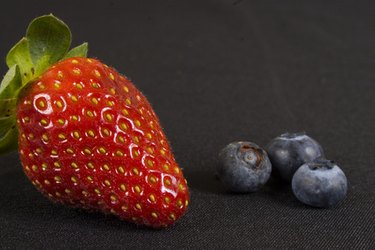
Gastric bypass surgery helps patients with obesity lose significant amounts of weight. The surgery reduces the size of the stomach and blocks some calorie absorption. Patients gradually progress through several dietary stages after surgery until they are able to tolerate a high protein, low sugar, low fat diet, according to Linda Aills, R.D., lead researcher, in a report published in the March 2008 issue of "Surgery for Obesity and Related Diseases."
Whole Fruit
Video of the Day
Patients may not eat whole fruits during the clear liquid and full liquid phases after surgery. During later stages, including the pureed and soft phases, some soft or mashed whole fruits may be included. Patients must consider the sugar and carbohydrate content of any food, including fruit, to avoid dumping syndrome. Dumping syndrome, caused by eating too much sugar or fat, produces shakiness, dizziness, sweating, nausea and vomiting, says the University of Maryland Medical Center. Berries -- blueberries, strawberries, raspberries and others -- contain less sugar and carbohydrates than other fruits, so patients tolerate them well, according to Bariatric Eating. Bananas, on the other hand, may cause discomfort and weight gain due to their high sugar content. Peeling and trimming fruits such as apples, oranges and grapefruit improve their digestibility. When patients add new foods at any phase, they should begin with very small amounts and chew eat bite well to promote digestion. If a particular food causes problems such as discomfort, diarrhea, nausea or vomiting, the patient should avoid that food.
Video of the Day
Processed Fruits
Patients may include mashed commercially prepared fruits in the pureed food phase after surgery. Sugar content, however, may make a particular fruit unacceptable if canned in light or heavy syrup. To avoid dumping syndrome, patients should look for fruit canned or jarred in no-sugar-added juice. No-sugar-added applesauce is appropriate as well.
Fruit Juices and Dried Fruits
Although approximately 40 percent of postoperative patients can tolerate diluted apple and orange juice, most must avoid or dilute these juices due to the high sugar content, notes Aills. Most patients must avoid dried fruits such as raisins, dried apricots and dried cranberries due to their high sugar content. Some patients may find that they tolerate these forms of fruit later after a year or two even if they cannot tolerate them early in the process.
Is this an emergency? If you are experiencing serious medical symptoms, please see the National Library of Medicine’s list of signs you need emergency medical attention or call 911.